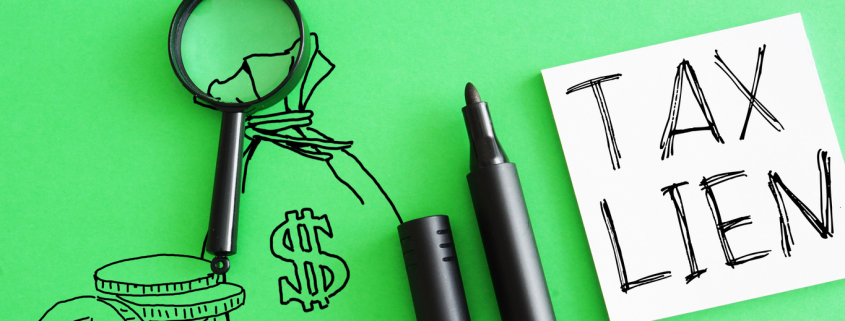Earn money by paying other people’s tax debts?
What sounds crazy at first is a very profitable system that is mainly used in the USA.
This mainly concerns property taxes on real estate.
If a land or property owner is unwilling or unable to pay their property taxes, the respective municipality in the USA has a liquidity problem.
She solves this quite charmingly by issuing a certificate (so-called tax lien) to anyone who pays property taxes for someone else, with which the holder of the certificate can claim back these taxes from the owner of the property, plus a not inconsiderable interest rate. As long as this certificate is not settled, the holder cannot (or only with great difficulty) sell his property or land and often also cannot mortgage it.
If the property owner does not pay the open sum over a period of several years, the holder of the certificate has the option of initiating foreclosure on the property. This leads – after a final deadline for the property owner – to an auction where the minimum bid is often just the sum of all outstanding allowances and government fees.
Either the certificate holder can now bid on the property himself if it is of interest, or wait to see if someone else calls the minimum bid and then have that successful bidder cash out any taxes and interest paid (since only then will the property be re-registered). can).
Up until a few years ago, the acquisition of these certificates was quite cumbersome because you had to take part in local auctions in each community, which was not worthwhile for investors with smaller sums, since the travel costs from city to city quickly increased the expected return cast shadows.
But now, the majority of states that sell these allowances have switched to online auctions, making it easy to research and bid from the comfort of your own home.
Like many things in the federal sprawl of the US, each state has its own set of rules for how these auctions are run. For example, in some states you bid the interest rate down, in others you bid on a fixed repayment amount.
In Florida, for example, all auctions start at 18% interest p.a. and you bid downwards in 0.25% increments. For example, if one bidder offers 18%, the second 16% and the third 12.5%, the third bidder will be awarded 15.75% (0.25 below the previous bidder). Some high-interest properties even go under the hammer for 0% interest if a bidder wants to be sure they’ll get into the foreclosure in a few years’ time and maybe pick up a multi-story office tower for a few hundred dollars.
Interest rates range from 0% to 20% across the participating states, with large differences depending on the type of property. For private homes in a good location, you will rarely get the maximum interest rate, but there is a greater certainty that the resident will pay the taxes promptly, since he does not want to be thrown out of his house, while with undeveloped areas or commercial real estate there is definitely a risk that the holder is insolvent or insolvent.
On average, over 90% of certificates issued are redeemed before the deadline, which can range from 2 to 7 years depending on the state, and most of the remaining certificates are serviced by the foreclosure winner. So the chance of losing your money completely is small, even if not completely zero. With some junk properties, the tax debts now exceed the value of the property, so you should refrain from investing here, since the owner’s motivation to compensate is low and there is no buyer for such a property, even at auctions.
The campaigns for the certificates take place once a year in each municipality, often over a period of several weeks. In different states in different months, so you can actually join almost any time. However, even if you miss the auction date, most municipalities sell leftover certificates to interested parties year-round. Here you just have to look a little more closely at the reason why the certificate was left over (not enough bidders at the auction, junk property, etc.)
Only US persons are permitted to participate in the auctions. But even if you are not a US citizen or resident, you can participate in the auctions through a US corporation. This is usually not possible with a disregarded-entity LLC, since the owner is often not a US taxpayer if the owner is resident abroad (or if they were registered as such, they would pay tax on their worldwide income in the USA, which is often not desirable). ).
In summary, investing in US tax liens offers the following advantages and disadvantages.
Advantages
- High interest rates
- Investment secured by real estate
- Possibility to buy real estate below market value
- Use the whole year (in most participating states)
- Start investing with less than $100 per lien
- Everything can be managed online (except lien auctions)
- Over 90% of lien certificates are usually redeemed
Disadvantages
- Unknown timing (a debtor can settle the certificate after 30 days or only after several years)
- Risk of junk real estate, detailed research necessary
- US Corporation necessary (and thus running costs)
- Taxation of interest income in the USA
Participating states Alabama, Arizona, Colorado, Florida, Illinois, Indiana, Iowa, Kentucky, Maryland, Mississippi, Missouri, Montana, Nebraska, New Jersey, North Dakota, Ohio, Oklahoma, South Carolina, South Dakota, Vermont, West Virginia, und Wyoming sowie der District of Columbia (Washington DC).




